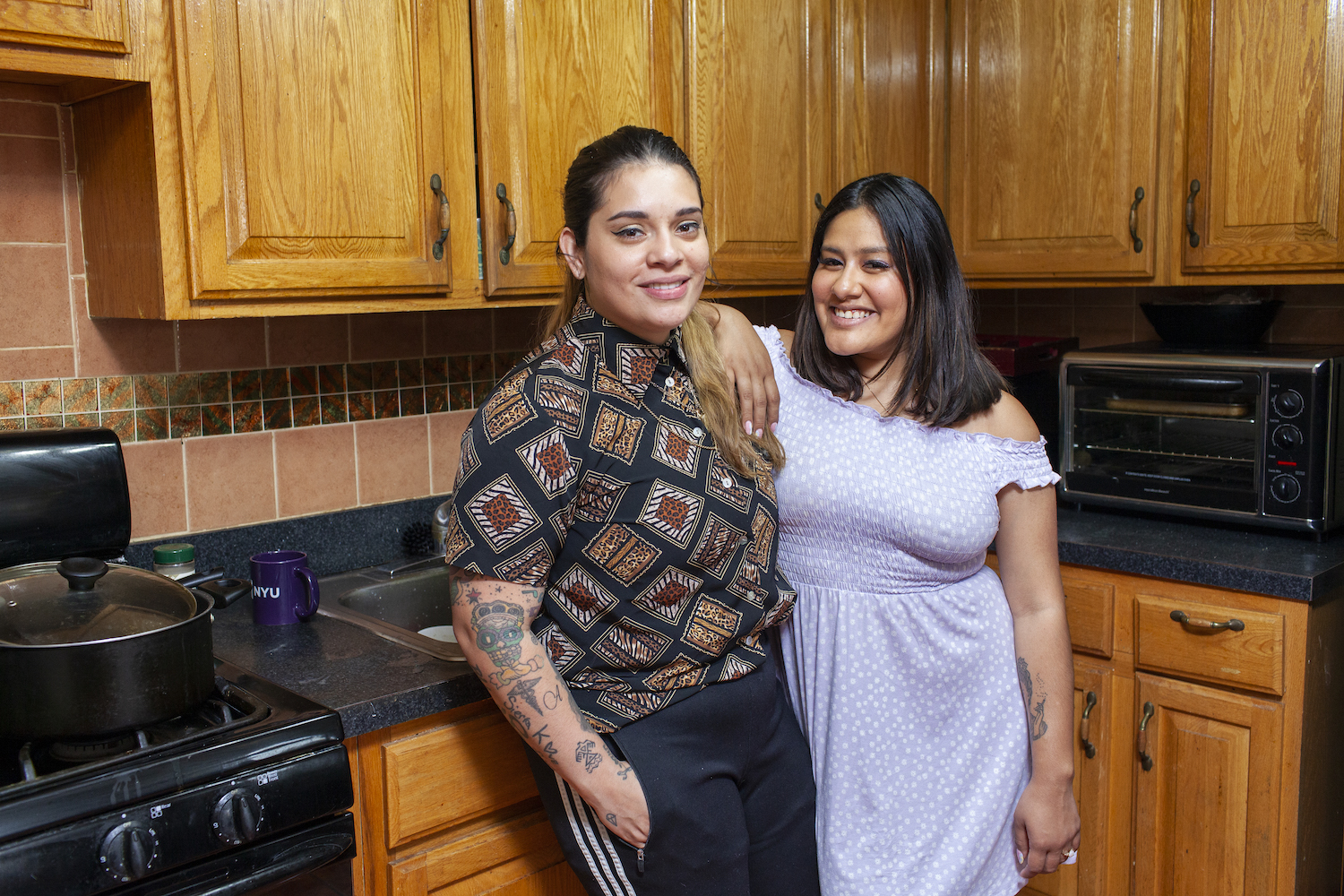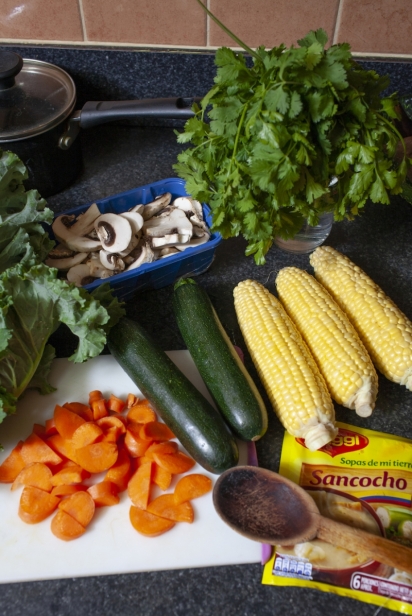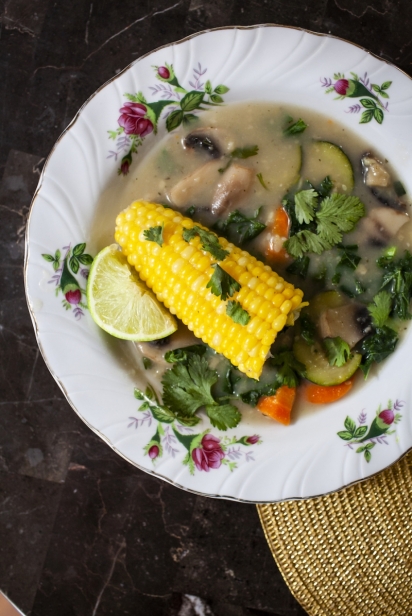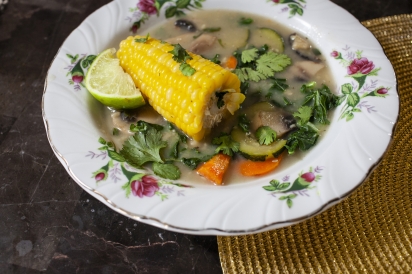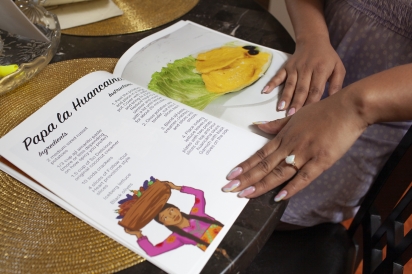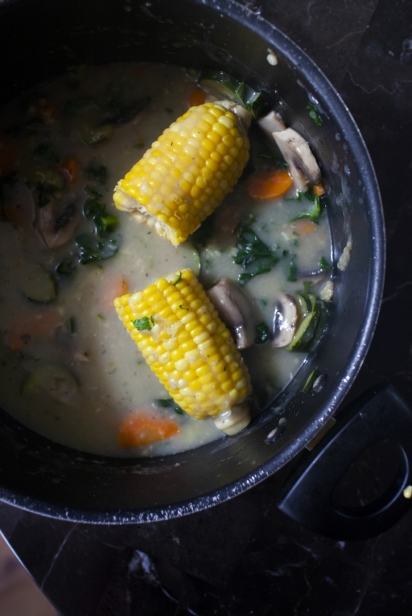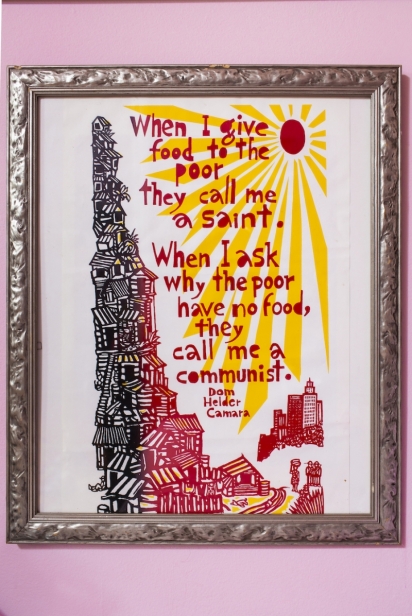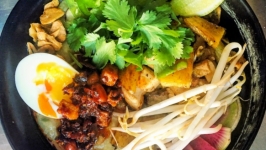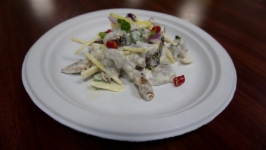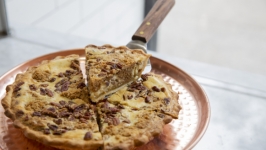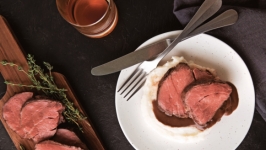Amy Quichiz, Founder of Veggie Mijas
Amy Quichiz’s smile brightens the doorway of her family’s Jackson Heights home. She speaks with candor and is quick to laugh, or cry—telltale traits of a Pisces, she disclaims.
The 24-year-old Colombian-Peruvian writer and community organizer glides through her mother’s kitchen in black cowgirl boots, talking moon signs, vegan burger politics and how she balances graduate school with running Veggie Mijas, the plant-based collective she founded in 2018 for women and nonbinary people of color.
“People ask me what’s the worst sign? I’m, like, ‘men,’” she jokes, rinsing kale leaves under the faucet. She settles in beside her girlfriend, Johanna Toruño, to chop carrots and mushrooms for sancocho, their plant-based version of a traditionally meat-heavy soup popular throughout Latin America.
Since childhood, her mother has made sancocho whenever she was sick. “Whenever I want to feel at home, we make this,” says Quichiz. “Year round, even if it’s hot outside.”
She admittedly hates cooking alone, and left to her own devices, she’d live on soy chicken nuggets. “She’s like a 5-year-old!” laughs Toruño, a trained chef and the street artist behind the Unapologetically Brown Series.
Quichiz’s veganism quickly rubbed off on Toruño when they met two years ago, and in return, Toruño inspires her to cook. Their new obsession is air-frying basically everything in Toruño’s Bushwick apartment, making homemade kale chips, sweet potato fries and empanadas.
Quichiz didn’t grow up tied to any rigid notions of how food defines identity, making her transition to veganism fairly easy. That openness stems from her mother, who came to the United States from Colombia without any family recipes, and taught herself to cook by watching a YouTube cooking show, “Cocinando con Wendy.”
“Our ancestral recipes got lost through migration, so I have this story of not knowing what my grandmother or great-grandmother used to eat.”
Quichiz reimagines the crops her father’s Indigenous Peruvian ancestors grew and what dishes her mother’s Colombian foremothers prepared before colonization; before they were labeled vegan.
Growing up in a Colombian neighborhood, Quichiz saw her identity mirrored by friends and local business owners. She ate cholados on the Bulova Park swingset and hung out with friends at Mama’s Empanadas until curfew. Few traditions excite her more than Queens Pride, where local queers, femmes, dykes and trans POC gather as one big family to sing and dance without the threat of violence.
“It’s a beautiful feeling to see yourself everywhere you walk. To give money to vendors in your own community. To see us be alive, having fun, not giving a f*ck,” says Quichiz, beaming.
Within her first year of college in Syracuse, she had found other queers of color and came out as bisexual. When Dominican and Cuban friends introduced her to animal rights from a queer leftist, feminist and anti-colonialist perspective, tying animal liberation to human liberation and environmental justice, she quickly transitioned to veganism.
When she returned home, Quichiz cleared the fridge of animal products, and came out to her parents. “At first they were, like, ‘What the hell—you came back gay and vegan? Where did I send you?’” she recalls.
It wasn’t overnight, nor a seamless transition, but soon enough her parents offered their support. Her mom found vegan recipes on YouTube for beloved dishes like Papa la Huancaina and, “little by little, I saw what was in the fridge start changing. Now, they don’t bring any animal products in the house.”
The aroma of sancocho has everyone’s stomach growling as Toruño ladles soup into shallow bowls etched in gold and red roses, topping each with half an ear of corn. “I feel like corn is an extension of my ancestors,” Toruño says. “My family grew coffee and corn in El Salvador.”
Sharing space and connecting ancestral roots with other vegans of color is what prompted Quichiz to start Veggie Mijas, which has grown to over 200 members. The collective’s first cookbook, Casa Verde (which Quichiz designed, edited and published) features stories and recipes from members across the country and around the world.
“Veganism contains everything,” says Quichiz, gently squeezing a lime over her steaming bowl. “Feminism, environmentalism, farmers and workers rights, queer liberation—you can take anything within political activism, and veganism can fit into that.”
Down the hallway from the kitchen is her bedroom, a soft pink cocoon filled with art and books. A floral notebook that reads “Sisterhood Over Capitalism, Sisterhood is Medicine” (created by Toruño) rests next to an altar of herbs, essential oils and small votive candles. Quichiz calls it her “witch stuff.” A pile of stuffed animals, including a plush, bearded Marx, rests against a set of pillows embroidered with a poem written by Toruño—a Christmas gift.
The couple plops onto the bed, chatting about the Green New Deal and videos of Alexandria Ocasio-Cortez cooking plant-based meals and tending her community garden plot. “She’s been talking a lot about accessibility and food deserts,” Toruño says pensively.
The rise in socialism excites Quichiz, who credits women of color for historically leading and feeding liberation movements, like the Zapatistas, Black Panthers and anti-apartheid activists from South Africa to Palestine.
Using food as the vehicle, Quichiz similarly creates space to share resources, put women and nonbinary POC at the forefront and shift power from corporations to communities. And it’s only the beginning.
Her dream is to work at the UN, “and I already have an internship there,” she says, “so we’ll see how that goes.”
Amy Quichiz | @imsecretlyacat
Veggie Mijas | @veggiemijas
Johanna Toruño | @johannareign
Unapologetically Brown Series | @theunapologeticallybrownseries
Casa Verde


